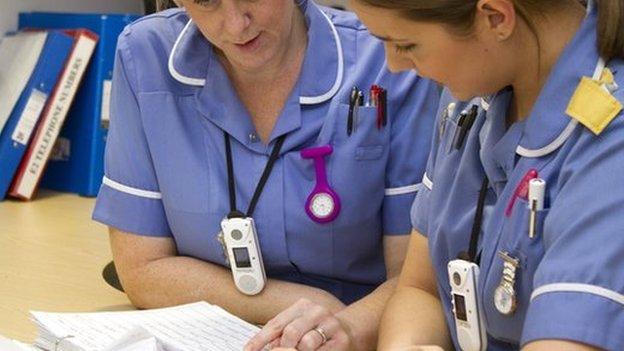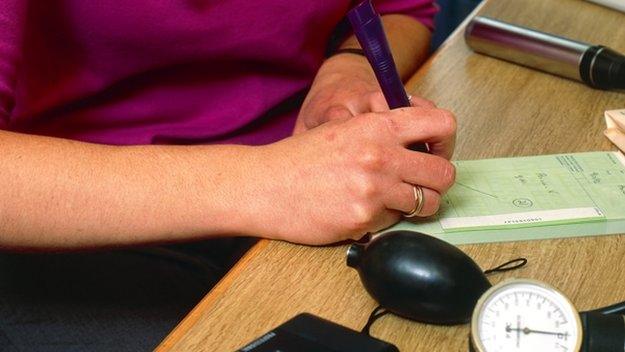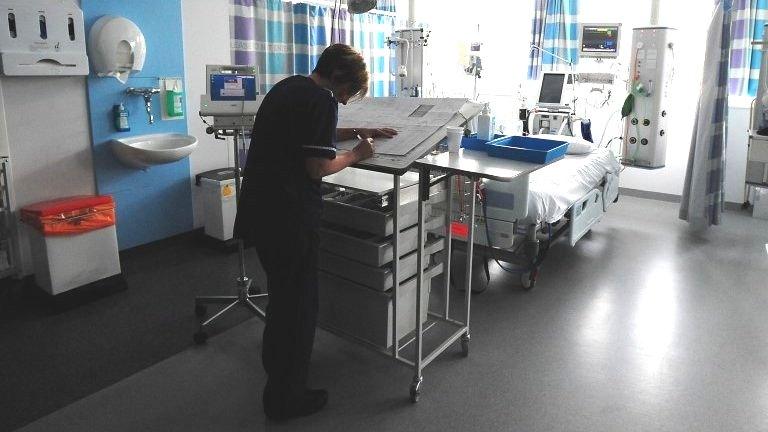NHS weekend: 7-day services explained
- Published

There is now a heated debate about seven-day services in the NHS in England.
But this issue has, in fact, been brewing for some time. Improving care at weekends has been under discussion for at least 20 years. During the 1990s, research began to emerge that the quality of care was not evenly spread over the week.
As evidence has grown, so has the clamour for change. In 2012 a study was published highlighting the increased risk of death for patients admitted at weekends compared to a Wednesday.
One of the authors of this was Sir Bruce Keogh, the medical director of the NHS in England.
At the end of 2013 he published a report calling on the NHS to adopt 10 standards to improve the quality of care available at weekends. These included everything from greater consultant availability to increased access to diagnostic tests.
Why is it such a hot topic now?
The government has made it a top priority. It was included in the Conservative Party manifesto and Prime Minister David Cameron made it a key part of his first speech after winning a majority in May, saying he wanted to see a truly seven-day service.
This has put ministers on a collision course with the medical profession. In a speech in July on hospitals, Health Secretary Jeremy Hunt said the British Medical Association was a "roadblock" to reform and gave them until mid-September to come to the table for talks about increasing weekend working.
The British Medical Association (BMA) has hit back, saying ministers are misrepresenting what happens at weekends and, if they are serious about extending services, that needs to be properly funded.
Meanwhile, doctors took to Facebook and Twitter over the summer to post photographs of themselves working using the hashtag #ImInWorkJeremy.
Then on Sunday the researchers behind the 2012 study published a fresh report on death rates using updated figures - and again found the risk of death was higher.

NHS weekend: Want to know more?
Visit the BBC's special report page on 7-day services (This link will not work on the BBC app but some of the key content can be seen below)
Nick Triggle: Does a Monday to Friday culture exist in hospitals?

What does the government want?
There are two strands to the policy. Firstly, they want local GP surgeries to open on a Saturday and Sunday.
They do not expect every surgery to be open and instead have urged GPs to work together with other practices to share the extended opening.
A pilot programme has already been run, which involved one in eight surgeries taking part. There have been reports that demand has been mixed.

In terms of hospitals, the focus is on extending what is already available.
While emergency care from A&E units to life-saving surgery is available at weekends, staffing levels are much lower, and access to key tests is more difficult than it is during the week.
Ministers have identified the opt-out consultants have in their contract - meaning they do not have to do non-emergency work at weekends - as a key barrier to improving weekend care.
They have given them until the middle of September to agree to open talks about removing this, or have said they will impose it on new doctors.
What has been the reaction of doctors?
GPs have questioned whether seven-day working is really necessary. There are already out-of-hours arrangements that are predominantly led by local doctors for patients who need urgent care.
They have also queried whether opening surgeries for routine care should be a priority when services are currently so stretched.
The medical profession is much more convinced about the need for improved access to key services, such as MRI and CT scans, as well as the need for improved staffing.
Many of the royal colleges which represent doctors working in different areas of medicine, have agreed change is needed. But the big question is how.
The BMA is concerned whether it will be properly funded, saying the extra money being promised for the NHS this parliament - £8bn by 2020 - was just meant to be for keeping current services afloat.
- Published16 July 2015

- Published16 July 2015
- Published21 June 2015

- Published19 June 2015

- Published19 June 2015
- Published30 September 2014

- Published15 December 2013
